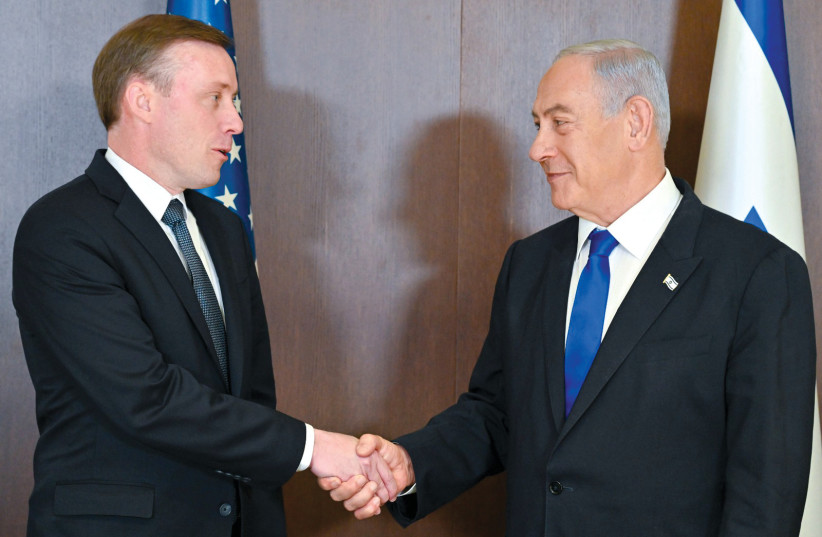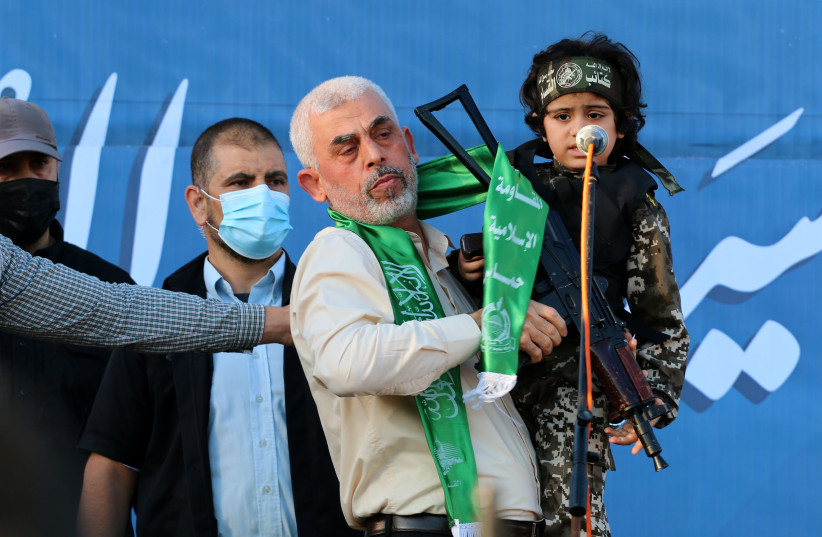Israel is expected to refrain from attacking the “no-strike” zones it created for Palestinian civilians in southern Gaza, US National Security advisor Jake Sullivan told reporters as the IDF battered that area of the enclave from the air and sea.
“In those [safe] zones we do expect Israel to follow through without striking,” he said.
The dilemma regarding the Gaza war, he said, is “how do you, on the one hand, allow a sovereign nation like Israel to go after terror targets while on the other hand, have them do so in a way that minimizes harm to civilians, that is really where the rubber hits the road in all of this.”
“Fundamentally we have laid our expectations that in the areas that Israel has asked people to go that it ensure the security and safety of civilians and that it does so in the conduct of its military operations and that it does so in the facilitation of humanitarian assistance getting to them,” he said.

International pressure on Israel
Sullivan spoke four days after the Gaza war resumed after a week-long pause ended on December 1. Hamas has asserted that close to 16,000 Palestinians have been killed in war violence since hostilities began on October 7 after the terror group infiltrated southern Israel killing over 1,200 people and seizing 240 hostages.
United Nations Secretary-General Antonio Guterres called for a “sustained humanitarian ceasefire in Gaza, the unconditional [and] immediate release of all hostages, and unimpeded [and] sustained humanitarian aid flow to meet the needs of the people throughout the Gaza Strip.”
Lynn Hastings, who is the humanitarian coordinator for the Palestinian territories, panned Israel’s safety zones in the south.
“Israeli military operations have expanded into southern Gaza, forcing tens of thousands of others into increasingly compressed spaces, desperate to find food, water, shelter and safety,” she said.
“Nowhere is safe in Gaza and there is nowhere left to go,” she added.
“The conditions required to deliver aid to the people of Gaza do not exist. If possible, an even more hellish scenario is about to unfold, one in which humanitarian operations may not be able to respond.”
“The quantities of relief supplies and fuel allowed in are utterly insufficient. Despite the enormous efforts of the Egyptian and Palestinian Red Crescent Societies, UN agencies, and other partners, the use of only the Rafah crossing - meant for pedestrians - to bring in trucks of goods does not work.
“What we see today are shelters with no capacity, a health system on its knees, a lack of clean drinking water, no proper sanitation, and poor nutrition for people already mentally and physically exhausted: a textbook formula for epidemics and a public health disaster,” she said.
The head of the Geneva-based International Committee of the Red Cross, visited Gaza on Monday, issuing a statement in which she said the level of human suffering was intolerable, called for the protection of civilians, respect for the laws of war, and the release of hostages held by Hamas.
"We would welcome Hamas laying down its arms"
In Washington, State Department spokesman Matthew Miller defended the resumption of Israel’s military campaign to oust Hamas from Gaza that began after the October 7 attack. He blamed Hamas for the war and said that more people should call for the terror group to lay down its arms.
“It is Hamas that is putting [Palestinian] civilians in harm's way. I am surprised that I do not hear more people say why doesn’t Hamas move out of schools? why doesn’t Hamas take additional steps to protect civilians? Because we think they should as we think Israel should.
“We would welcome Hamas laying down its arms at any point,” he added. “They could do it today if they cleared about Palestinian civilian life.”

Miller also called on Israel to do more to protect civilians in Gaza, as Hamas asserted that close to 16,000 Palestinians have been killed in war-related violence.
The United States is watching IDF actions in Gaza “very closely,” Miller said as he explained that there were differences between Israel’s military campaign that resumed on December 1 and the one that ended on November 24.
“Too many Palestinians were killed in the opening weeks of the conflict, “ Miller said.
“We have seen a more targeted request for evacuations” by Israel so that the army is focused on clearing specific points rather than asking an entire city to evacuate, Miller said.
Civilians have been asked to relocate to “de-confliction zones rather than being asked to flee, Miller said.
During US Secretary of State Antony Blinken's visit to Israel last week, he clarified to officials “We do not want a military campaign in the south that looks like it was in the north.”
Blinken was briefed “on plans intended to avoid mass casualties.”
It was understood that there would be civilian casualties, “that is true in all war zones and is particularly true here” given that Hamas operates from within civilian areas, Miller said.
Both Miller and Sullivan addressed the collapse hostage deal by which 81 women and children were freed, but there are still some 17 or 20 women and children among the captives.
Qatar and Egypt mediated the deal. Sullivan said that Israel and US officials are still in conversation with those two countries to seek a way to resume hostage releases.
Miller said that the hostage deal partially fell apart last week because Hamas wanted to prevent the remaining Israeli women it holds in Gaza from talking about their time in captivity.
“It seems one of the reasons they don’t want to turn women over that they have been holding hostage and the reason this pause fell apart is that they do not want these women to be able to talk about what happened to them during their time in captivity,” Miller alleged during an emotional moment in the press conference.
Later in the briefing, Miller clarified that he does not know this claim to be a definitive fact.
Separately, in the briefing in Washington, Miller addressed the issue of settler violence saying that the US has also spoken with Israel about doing more to crack down on attacks against innocent Palestinians in the West Bank, Miller said.
“We have seen them take some steps to respond to violence. We do not think those steps have been sufficient. They need to prosecute people who engage in violence against [innocent] Palestinians,” he said.
“We have made very clear to the Israeli government that we will be taking additional steps to hold people accountable for violent extremism,” he said, explaining that this could include visa restrictions.
Miller also addressed the issue of rising antisemitism, condemning it in the strongest terms.
“We oppose antisemitism wherever we see it,” Miller said. It’s tragic that after October 7, “one of the responses has been an increase in antisemitism that is extremely tragic and it’s incumbent on everyone in positions of authority to speak out.”
